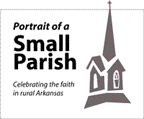

CORNING -- The Catholic church in Corning has a certain glow.
Sunlight filtering through one or more of four cruciform stained-glass windows, depending on the time of day, captures part of the intensity.
But the sensation runs deeper than the physical design of St. Joseph the Worker Church, impressive as the towering A-frame with its gleaming cypress and walnut may be.
"We're the only Catholic presence in Clay County," said Fran Black, the church sacristan, bookkeeper and custodian. (She also plays the organ.)
Her comments -- echoed later by Father John Marconi, who served St. Joseph for six years from the parent church in Paragould -- reflects a depth of feeling dating back nearly 60 years when Black's father-in-law, Charles R. Black, and three other men organized the northeast Arkansas parish.
Charles Black, John Sandor, Roman Selig and Willard Zoeller wanted to attend Mass with family and friends in Corning, and no longer make Sunday-morning drives to Paragould, Pocahontas or Poplar Bluff, Mo.
Fran's husband, John Black, was a boy when the mission church opened on the second floor of the State Theater in Corning. The first Mass in "The Upper Room" was celebrated Sept. 11, 1949.
After fire gutted the building in 1967, the congregation found temporary quarters in a vacant church on the north edge of town. Meantime, timber had been cut at J.W. Black Lumber Co. awaiting construction of the new church in an oak tree-shrouded square block south of the city park along U.S. 67.
Click here |
At its peak, St. Joseph's membership probably totaled 30 families, Fran Black said. She can remember 32 children taking parish religious education classes. Today, the parish counts 19 registered families, draws maybe 20 to 24 for 4 p.m. Saturday Mass, and the one First Communion candidate in Corning goes to Pocahontas for religious education. St. Joseph might host one or two baptisms a year.
John Black attributed the decline in active parish membership, in part, to the closing or relocation of labor-intensive factories -- including a shoe manufacturer, automobile carburetor plant and electric motor company.
"Most of the plants moved south and took a Catholic or two with them," John Black said.
Corning's population has stayed put, in the 3,500 range.
The Blacks believe the 4 p.m. Saturday liturgy, rescheduled several years ago from 4:30 p.m., is more convenient for parishioners, visitors from Missouri and Father Matthew Garrison, the current pastor of St. Mary in Paragould.
"After Mass, no one rushes out the door," Fran Black added. "That's our time to visit. The pastor is here with us."
St. Joseph's has no parish hall.
"The population declined, so we declined to build," John Black said.
Father Garrison advised his mission church that the sanctuary was not the proper setting for a statue of the resurrected Christ. St. Joseph Renovation Committee replaced the image with a crucified Christ and is awaiting the arrival of statues of Mary and Joseph to place on either side of the crucifix.
The icons came from Italy, as did the hand-carved Stations of the Cross.
"We don't have a financial problem," John Black said. "What we've got are attendance problems."
St. Joseph's has been "blessed" with money willed to the church and the generous support of active parishioners, the Blacks said. The parish council meets for 15 to 30 minutes each January to review the books and allocate contributions from interest earned on church deposits to the Carmelite sisters, Maryknoll missionaries, Catholic elementary schools in Paragould and Pocahontas and the Catholic Church Extension Society.
"Since we didn't have a building project, we use the money to propagate the faith," John Black said.
"We want to keep our mission church open," said Fran Black, who took on the task of volunteer sacristan and bookkeeper after the death of Roman Selig in 2002.
She lays out linens and vestments, lights the candles and generally prepares the sanctuary for Mass. The pews face the altar on three sides, with the stained-glass crosses above and beyond them. On sunny Saturdays, people sitting in the east section will literally glow.
Please read our Comments Policy before posting.
Article comments powered by Disqus Don’t let misconceptions cause faith to waver
Don’t let misconceptions cause faith to waver
 Seniors, whatever storms may come, Jesus will be there
Seniors, whatever storms may come, Jesus will be there
 Studio 3:16 offers new approach to teaching religion
Studio 3:16 offers new approach to teaching religion
 After three decades, NLR principal plans to retire
After three decades, NLR principal plans to retire
 CHS athlete overcomes odds to reach collegiate goal
CHS athlete overcomes odds to reach collegiate goal
 St. Joseph a model of solidarity with immigrants
St. Joseph a model of solidarity with immigrants
 Two gifts after Jesus’ death: Virgin Mary and Eucharist
Two gifts after Jesus’ death: Virgin Mary and Eucharist
 Why we have an altar, and not just a communion table
Why we have an altar, and not just a communion table
 Pope: Wars should be resolved through nonviolence
Pope: Wars should be resolved through nonviolence
 Living relationship with Jesus Christ in the Eucharist
Living relationship with Jesus Christ in the Eucharist